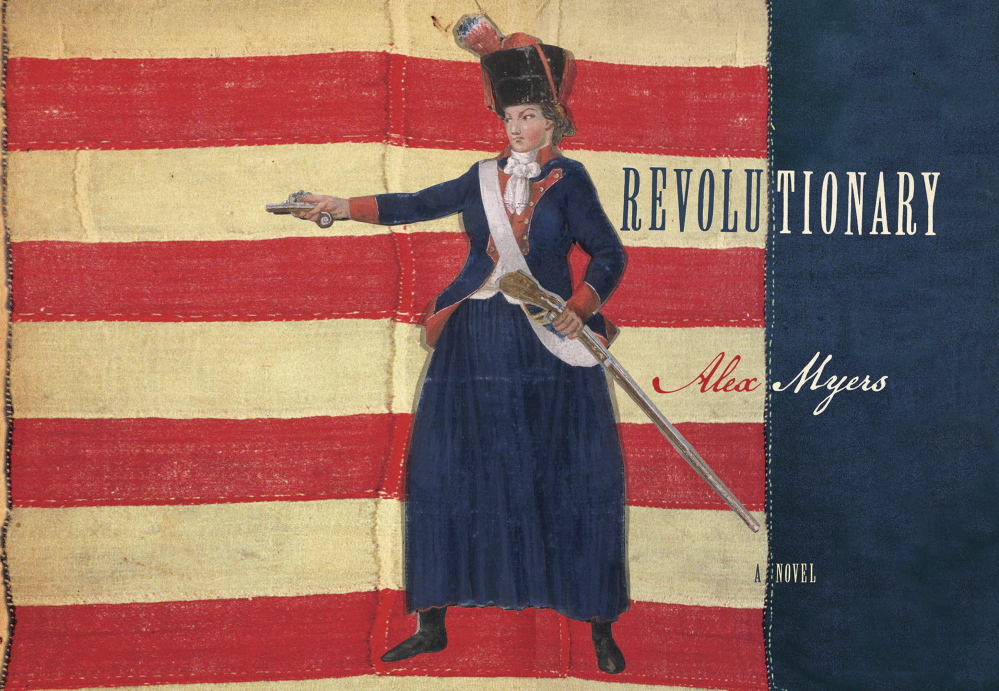Alex Myers can identify with Deborah Samson, the heroine of his recently released novel, “Revolutionary.” This, despite the fact that Samson is an indentured weaver in colonial America during the Revolutionary War.
Myers grew up hearing his grandmother and mother tell of Samson, a distant relative. But Myers’ sense of affinity is not just that he and Samson are related, nor that they’re both native New Englanders. Rather, it’s the fact that both Myers and Samson were born in girls’ bodies but chafed at the ill-fitting confines of being female.
For Samson, it was the constraints of being chattel to father/master/husband, of not being able to live freely, do what she wanted and have her opinions and her merits taken seriously. For Myers, it ran deeper, beginning with his earliest memories, feeling that, though he was born a girl, he was really a boy.
Samson made the choice to disguise her gender in order to sign up and serve as a soldier in the Colonial Army. Growing up in Paris, Maine, Myers didn’t know there were options to consider until he want off to Phillips Exeter Academy in the ninth grade, where he first met transgender individuals. He went home between his junior and senior years to tell his parents his decision to live as a man. He called up the administration at Exeter and told them he’d be returning in the fall as male. He was the first openly transgender student at both Exeter and Harvard and advocated for greater acceptance of transgender students at both institutions.
Samson managed to keep her true gender identity secret for most of the 18 months she served in the Continental Army from 1782 to 1783, serving under the name of Robert Shurtliff, her dead brother. She fought valorously in numerous battles and was seriously wounded. She revealed her true identity to her general in the last days of the war. Eight years after the war, she petitioned the Massachusetts Legislature for pay that had been withheld. Gov. John Hancock signed the bill approving her request.
In 1804, Paul Revere worked on her behalf to have the federal government grant her a pension for her service, which was approved in 1805. The Massachusetts Legislature declared her the official state heroine in 1983.
Alex Myers lives in Washington, D.C., with his wife, where he is a fellow at Georgetown University and teaches at American University.
Though “Revolutionary” is a well-told story, what I found most fascinating in reading it was knowing the personal backstory of the author, appreciating the singularity of perspective Myers brought to the unique story of Deborah Samson.
Q: What ultimately prompted you to write “Revolutionary”?
A: I seriously started pursuing the idea of it in the middle of my MFA program at Vermont College. Somebody there gave me a piece of advice: write a story you’re in love with. I’d always been really fascinated with Deborah Samson. In January 2010, I decided to write the novel, and began the research.
Q: Tell me about your personal transgender journey.
A: I always thought I was a boy – or should have been a boy – or wanted to be a boy. When somebody would ask me what I wanted to be when I grew up, I told them I wanted to be a boy.
I was the prototypical tomboy. Going through school in Paris, Maine, I was with the same 12 kids from kindergarten to 12th grade. They knew me as a very butch girl. I loved sports. When my mother would let me, I would cut my hair short and was often mistaken as a boy. We had a substitute teacher once who thought I was a boy. She asked me why my parents named me Alice. I told her they named me after Alice Cooper.
In Paris, I didn’t know anybody who was gay. When I went off to boarding school, I began to meet transgender people and thought for the first time that it was a possibility to live as a male. I came out first as a lesbian to friends when I was 14. And then when I was about to turn 17, I came out as transgender. To my parents’ and Exeter’s credit, they handled the change with compassion and understanding – far more than I had hoped for.
Q: During this time, did you think about Deborah Samson?
A: I did. I joked with a friend that it runs in the family. I thought about Deborah’s struggle in 1782, and that here I was struggling with it in 1985. I began to have a lot more sympathy for her.
A lot of people don’t think that transgender is real. Her story became an empowering story for me.
But the more research I did on her for the book, the less I felt I could truly describe her as transgender. She wanted two things: she wanted money – she was incredibly poor. And she wanted freedom or independence or self-determination – which women didn’t have then. Women were really chattel. They had no control over their destinies. It’s hard to imagine that part of the past – or to romanticize it.
Doing research for the book made me think a lot more about gender identity – how it changes yet stays the same over time. As a transgender person, I’m always pushing against society for what people expect from me. I had never thought of it that way before, but thinking about what Deborah did really clarified transgender identity for me. A lot of people think, ‘Now you’re a boy, your battle is done.’ But I still feel that I’m pushing against it, speaking out on what society expects of women and what it expects of men.
I speak with educators, asking whether they tell girls who speak up a lot in class to hold back more. And whether they give praise to boys for speaking up. I ask if they ever tell boys to talk less. I’m talkative, but as a girl in school, I was asked to hold back more in class discussions. I’ve had teachers since tell me that they get all over boys for being too quiet.
Q: I was fascinated with how you dealt with pronouns, and when or whether to refer to your protagonist as “Deborah” or “Robert.”
A: That was tough. There was much that remained the same following the first draft, but how to handle that issue did change. In the first version, I had her “Deborah” until she abruptly became “Robert” in a coming-of-age moment. After which she remained Robert to the end.
The more I thought about it, there were a lot of little moments throughout the story when Deborah felt encouraged that people saw her as a man. I went back and began to sort it out more psychologically.
I do think in my own experience, there are moments when I am so aware that I am not a man, or not a woman. I wanted to use the novel to play with that.
Q: At one point as a soldier, Robert ruminates on the thought that Deborah was “an inconvenience, like a boil on one’s buttocks – unpleasant and unlikely to go away.” How he wished that he could burst it, even knowing it would leave a scar. Can you comment on this?
A: I wanted to characterize Deborah through the book, that this wasn’t a lark to her, but it was not fully thought through. After overcoming the initial challenges, she likes who she has become. She begins to accept that, and that she doesn’t want to be Deborah. But she knows how ever much she wanted to be Robert, she can’t erase Deborah.
I draw on this heavily in my own life. I was a woman. It is a large part of my gender identity. Many transgender people feel that they were always the gender they claim. My gender identity is heavily influenced by the fact that I was a girl for 17 years. And then I became a man. I feel that I straddle the gender divide. But there are days when I don’t think of it at all.
I can’t explain how good it felt to start to live as a guy. It felt really good. It didn’t matter that I was around people who knew me as a girl. I messed up pronouns for them. But I didn’t care. It’s the easiest thing to do or be who you really are. The hard thing is to deny it. It is so freeing to admit this is who I am.
Frank O Smith is a Maine writer and ghost writer whose novel, “Dream Singer,” a finalist for the Bellwether Prize, will be published in September. Contact him via thewritinggroup.com.
Copy the Story LinkSend questions/comments to the editors.




Success. Please wait for the page to reload. If the page does not reload within 5 seconds, please refresh the page.
Enter your email and password to access comments.
Hi, to comment on stories you must . This profile is in addition to your subscription and website login.
Already have a commenting profile? .
Invalid username/password.
Please check your email to confirm and complete your registration.
Only subscribers are eligible to post comments. Please subscribe or login first for digital access. Here’s why.
Use the form below to reset your password. When you've submitted your account email, we will send an email with a reset code.